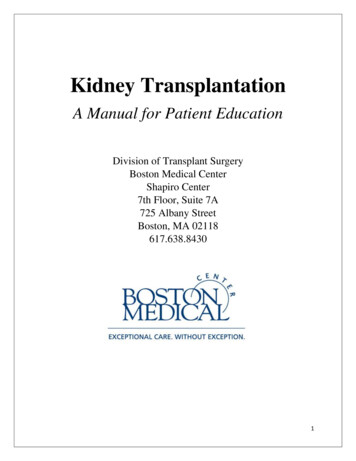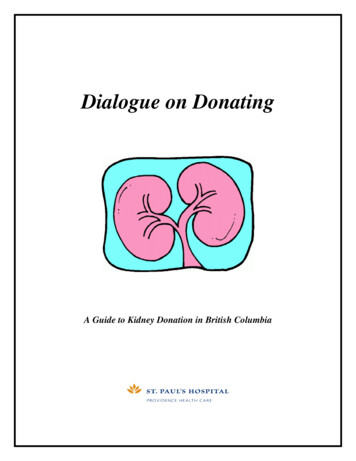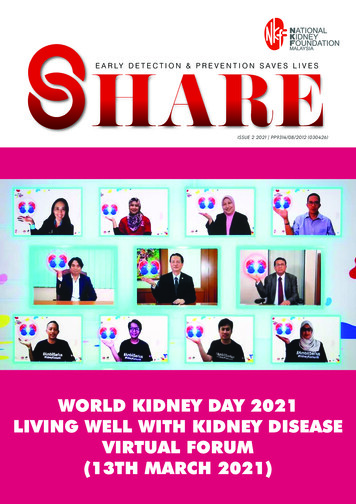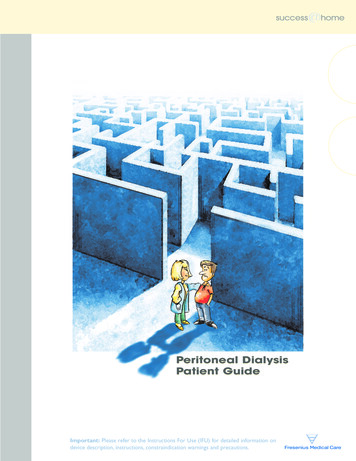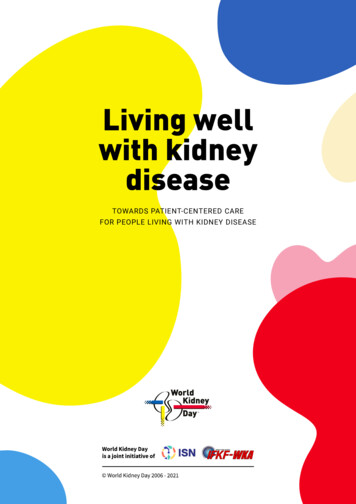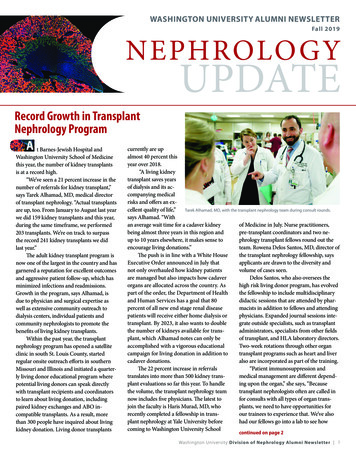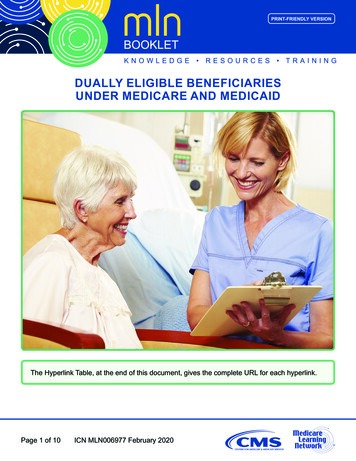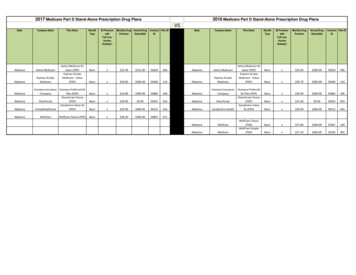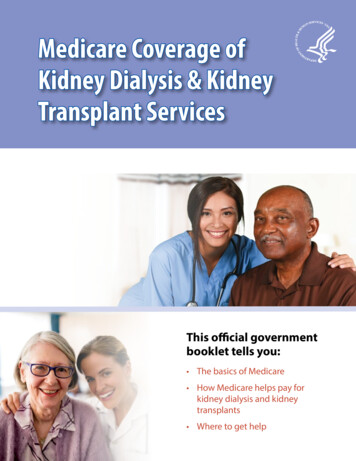
Transcription
Medicare Coverage ofKidney Dialysis & KidneyTransplant ServicesThis official governmentbooklet tells you: The basics of Medicare How Medicare helps pay forkidney dialysis and kidneytransplants Where to get help
C E NT E R SF O RM E D I C A R E&The information in this booklet describesthe Medicare Program at the time thisbooklet was printed. Changes may occurafter printing. Visit Medicare.gov, or call1-800-MEDICARE (1-800-633-4227) to get themost current information. TTY users can call1-877-486-2048.“Medicare Coverage of Kidney Dialysis &Kidney Transplant Services” isn’t a legaldocument. Official Medicare Program legalguidance is contained in the relevant statutes,regulations, and rulings.M E D I C A I DS E RV I C E S
3Table of contentsIntroduction . . . . . . . . . . . . . . . . . . . . . . . . . . . . . . . . . . . . . . . 4Section 1: Medicare basics . . . . . . . . . . . . . . . . . . . . . . . . . . . . . . 5Section 2: Kidney dialysis . . . . . . . . . . . . . . . . . . . . . . . . . . . . . . 15Section 3: Kidney transplants . . . . . . . . . . . . . . . . . . . . . . . . . . . 23Section 4: Medicare drug coverage (Part D) . . . . . . . . . . . . . . . . . . 27Section 5: Costs & payments . . . . . . . . . . . . . . . . . . . . . . . . . . . . 31Section 6: Filing a complaint (grievance) about dialysis orkidney transplant care . . . . . . . . . . . . . . . . . . . . . . . . . 37Section 7: Other kinds of health coverage . . . . . . . . . . . . . . . . . . . 39Section 8: Where to get more information . . . . . . . . . . . . . . . . . . . 43Section 9: Definitions . . . . . . . . . . . . . . . . . . . . . . . . . . . . . . . . 47
4IntroductionThis booklet explains what Medicare covers and how Medicare helps pay forkidney dialysis and kidney transplant services in Original Medicare.People with End-Stage Renal Disease can choose either Original Medicare ora Medicare Advantage Plan when deciding how to get Medicare coverage. Seepage 8 for more information.If you’re in a Medicare Advantage Plan (or another Medicare health plan), yourplan must give you at least the same coverage that Original Medicare gives. But,your costs, rights, protections, and/or choices of where you get your care maybe different. You may also beable to get some extra benefits.Read your plan materials or callyour benefits administrator formore information.Talk with your health care teamto learn more about permanentkidney failure and yourtreatment options.Your doctors, nurses, socialworkers, dieticians, and dialysistechnicians make up your healthcare team. Your health careteam can help you decide what’sbest for you based on yoursituation. If you have questionsabout Medicare or need moreinformation, visit Medicare.gov,or call 1-800-MEDICARE(1-800-633-4227). TTY userscan call 1-877-486-2048.
51SECTIONMedicare basicsWhat’s Medicare?Medicare is health insurance for: People 65 and older People under 65 with certain disabilities People of any age with End-Stage Renal Disease (ESRD) (permanentkidney failure requiring dialysis or a kidney transplant)What does Medicare cover?Medicare Part A (Hospital Insurance) helps cover: Inpatient care in hospitals Skilled nursing facility care Hospice care Home health careMedicare Part B (Medical Insurance) helps cover: Services from doctors and other health care providers Outpatient care Home health care Durable medical equipment (like wheelchairs, walkers, hospital beds, andother equipment) Many preventive services (like screenings, shots or vaccines, and yearly“Wellness” visits)Words in blueare defined onpages 47–49.For more details about what Medicare covers, visit Medicare.gov, or call1-800-MEDICARE (1-800-633-4227). TTY users can call 1-877-486-2048.
6Section 1: Medicare basicsDetermine if you’re eligibleYou can get Medicare no matter how old you are if your kidneys no longer work,you need regular dialysis or have had a kidney transplant, and one of these appliesto you: You’ve worked the required amount of time under Social Security, the RailroadRetirement Board (RRB), or as a government employee. You’re already getting or are eligible for Social Security or RRB benefits. You’re the spouse or dependent child of a person who meets either of therequirements above.You must also file an application and meet any waiting periods that apply.If you qualify for Medicare Part A, you can also get Medicare Part B. Most peoplemust pay a monthly premium for Part B. See page 31. Enrolling in Part B is yourchoice, but you’ll need both Part A and Part B to get the full benefits availableunder Medicare to cover certain dialysis and kidney transplant services.If you don’t qualify for Medicare, you may be able to get help from your state topay for your dialysis treatments. See page 41.Call Social Security at 1-800-772-1213 for more information about the requiredamount of time needed under Social Security, the RRB, or as a governmentemployee to be eligible for Medicare based on ESRD. You can also visitsocialsecurity.gov. TTY users can call 1-800-325-0778.
Section 1: Medicare basics7Determine if you’re eligible (continued)If your child has ESRDYour child can be covered if you or your spouse has worked the required amountof time under Social Security, the Railroad Retirement Board (RRB), or as agovernment employee. Your child can also be covered if you, your spouse, or yourchild gets Social Security or RRB benefits, or is eligible to get those benefits.Medicare can help cover your child’s medical costs if your child needs regulardialysis because their kidneys no longer work, or if they had a kidney transplant.Visit -esrd for more information. To enroll yourchild in Medicare, or to get more information about eligibility, call or visit yourlocal Social Security office. You can call Social Security at 1-800-772-1213 tomake an appointment. TTY users can call 1-800-325-0778.Medicare plan choicesYou can get your coverage through Original Medicare. Or, if you have ESRD,you can enroll in a Medicare Advantage Plan during Open Enrollment(October 15 - December 7) for coverage starting January 1.If you have ESRD & choose Original MedicareYou can go to any doctor or supplier that’s enrolled in and accepts Medicare andis accepting new patients, or to any participating hospital or other facility.You pay a set amount for your health care (deductible) before Medicare pays itsshare. Then, Medicare pays its share, and you pay your share (coinsurance orcopayment) for covered services and supplies.When you have Original Medicare, you can add Medicare drug coverageby joining a Medicare drug plan. Different plans cover different drugs, but plansmust cover most medically necessary drugs. See page 27 for more information.
8Section 1: Medicare basicsMedicare plan choices (continued)If you have ESRD & choose a Medicare Advantage PlanIf you have ESRD, you can enroll in a Medicare Advantage Plan during OpenEnrollment (October 15–December 7) for coverage starting January 1.Medicare Advantage Plans are a type of Medicare health plan offered by a privatecompany that contracts with Medicare to give all of your Part A and Part B benefits.Most Medicare Advantage Plans also offer drug coverage. Medicare AdvantagePlans must cover all of the services that Original Medicare covers.Some plans also offer extra coverage, like vision, hearing and dental coverage.Each Medicare Advantage Plan can charge different out-of-pocket costs.Important: In many cases, you’ll need to use health care providers who participatein the plan’s network and service area. Before you enroll, check with your providersand the plan you’re considering to make sure the providers you currently see(like your dialysis facility or kidney doctor), or want to see in the future (like atransplant specialist), are in the plan’s network. If you’re already in a MedicareAdvantage Plan, check with your providers to make sure they’ll still be part of theplan’s network next year. To learn more about a specific Medicare Advantage Plan,contact the plan, or visit Medicare.gov/plan-compare.If you join a Medicare Advantage Plan during Open Enrollment but change yourmind, you can switch back to Original Medicare or change to a different MedicareAdvantage Plan (depending on which coverage works better for you) during theMedicare Advantage Open Enrollment Period (January 1–March 31).To learn more about Medicare Advantage Plans, visit -health-plans/medicare-advantage-plans.For more information about your Medicare plan choices, look at your “Medicare &You” handbook or visit Medicare.gov. You can also call 1-800-MEDICARE(1-800-633-4227) to get more information. TTY users can call 1-877-486-2048.
Section 1: Medicare basicsHow to sign up for MedicareIf you’re eligible for Medicare because of ESRD, you can enroll in Medicare byvisiting your local Social Security office or calling Social Security at1-800-772-1213. TTY users can call 1-800-325-0778.Once you’re enrolled in Medicare, you’ll need to choose how you get yourcoverage. See pages 7–8. For more information on your coverage options,visit Medicare.gov.Note: If you’re already enrolled in Medicare based on age or disability, andyou’re already paying a higher Part B premium because you didn’t enroll inPart B when you were first eligible, the penalty will stop when you becomeeligible for Medicare based on ESRD. Call your local Social Security office tomake an appointment to re-enroll in Medicare based on ESRD.When Medicare coverage beginsEligibility for Medicare coverage based on ESRD works differently than othertypes of Medicare eligibility. If you’re eligible for Medicare based on ESRD anddon’t sign up right away, your coverage could start up to 12 months before themonth you apply.Example: If you become eligible for Medicare based on ESRD in February, butdon’t sign up for Medicare until November, your Medicare coverage will start inFebruary (this is called retroactive coverage).For more information, visit Medicare.gov or call 1-800-MEDICARE(1-800-633-4227). TTY users can call 1-877-486-2048.If you’re on dialysisWhen you enroll in Medicare based on ESRD and you’re on dialysis, Medicarecoverage usually starts on the first day of the fourth month of your dialysistreatments. For example, if you start dialysis on July 1, your coverage will beginon October 1.JulyFirst month ofdialysis.AugustSecond monthof dialysis.SeptemberOctoberThird month ofdialysis.Fourth monthof dialysis.Medicarecoverage begins.9
10Section 1: Medicare basicsWhen Medicare coverage begins (continued)Medicare coverage can begin the first month of a regular course of dialysistreatments if you meet both of these conditions: You participate in a home dialysis training program offered by a Medicarecertified training facility during the first 3 months of your regular course ofdialysis. Your doctor expects you to finish training and be able to do your own dialysistreatments.Important: Medicare won’t cover surgery or other services needed to prepare fordialysis (like surgery for blood access (fistula)) before Medicare coverage begins.However, if you complete home dialysis training, your Medicare coverage willstart the month you begin regular dialysis, and these services could be covered.If you’re already getting Medicare due to age or disability, Medicare will coverphysician-ordered fistula placement or other preparatory services before dialysisbegins.If you’re getting a kidney transplantMedicare coverage can begin the month you’re admitted to a Medicare-certifiedhospital for a kidney transplant (or for health care services that you need beforeyour transplant) if your transplant takes place in that same month or within thenext 2 months.Example: Mr. Green will be admitted to the hospital on March 11 for his kidneytransplant. His Medicare coverage will begin in March. If his transplant isdelayed until April or May, his Medicare coverage will still begin in March.If your transplant is delayed more than 2 months after you’re admitted to thehospital (for the transplant or for health care services you need before yourtransplant), Medicare coverage can begin 2 months before your transplant.Example: Mrs. Perkins was admitted to the hospital on May 25 for some tests sheneeded before her kidney transplant. She was supposed to get her transplant onJune 15. However, her transplant was delayed until September 17. Therefore, Mrs.Perkins’ Medicare coverage will start in July—2 months before the month of hertransplant.
Section 1: Medicare basicsWhen Medicare coverage endsIf you’re eligible for Medicare only because of permanent kidney failure, yourMedicare coverage will end: 12 months after the month you stop dialysis treatments. 36 months after the month you have a kidney transplant.Your Medicare coverage will resume if: You start dialysis again, or you get a kidney transplant within 12 months afterthe month you stopped getting dialysis. You start dialysis or get another kidney transplant within 36 months after themonth you get a kidney transplant.How Medicare works with employer or union group healthplan coverageIf you’re eligible for Medicare only because of permanent kidney failure, yourcoverage usually can’t start until the fourth month of dialysis (also known asa “waiting period”). This means if you have coverage through an employer orunion group health plan, that plan will be the only payer for your first 3 monthsof dialysis (unless you have other coverage).If your employer or union plan doesn’t pay all costs for dialysis, you mayhave to pay some of the costs. You may be able to get help paying these costs.See pages 39–41.Once you become eligible for Medicare because of permanent kidney failure(usually the fourth month of dialysis), there will still be a period of time, calleda “coordination period,” when your employer or union group health plan willcontinue to pay your health care bills.If your plan doesn’t pay 100% of your health care bills, Medicare may pay someof the remaining costs. This is called “coordination of benefits,” under which yourplan “pays first” and Medicare “pays second.” During this time, Medicare is calledthe secondary payer (the insurance policy, plan, or program that pays second on aclaim for medical care). This coordination period lasts for 30 months.11
12Section 1: Medicare basicsThe 30-month coordination periodThe 30-month coordination period starts the first month you would be eligibleto get Medicare because of permanent kidney failure (usually the fourth monthof dialysis), even if you haven’t signed up for Medicare yet.Example: If you start dialysis and are eligible for Medicare in June, the30-month coordination period will start September 1, the fourth month ofdialysis, even if you don’t have Medicare.If you participate in home dialysis training or get a kidney transplant during the3-month waiting period, the 30-month coordination period will start earlier.During this 30-month period, Medicare will be the secondary payer.Important: If you have employer or union group health plan coverage, tellyour health care provider that you have this coverage. This is very importantto make sure that your services are billed correctly. At the end of the 30-monthcoordination period, Medicare will pay first for all Medicare-covered services.Your employer or union group health plan coverage may still pay for servicesnot covered by Medicare. Check with your plan’s benefits administrator.There’s a separate 30-month coordination period each time you enroll inMedicare based on permanent kidney failure. For example, if you get a kidneytransplant that continues to work for 36 months, your Medicare coverage willend (unless you have Medicare based on your age or disability).If after 36 months you enroll in Medicare again because you start dialysis or getanother transplant, your Medicare coverage will start right away. There will beno 3-month waiting period before Medicare begins to pay. However, there willbe a new 30-month coordination period if you have employer or union grouphealth plan coverage.
Section 1: Medicare basics13Do I have to get Medicare if I already have an employer or union grouphealth plan?No, but think carefully about this decision. If you get a kidney transplant, you’llneed to take immunosuppressive drugs for the rest of your life, so it’s importantto know if they’ll be covered. Medicare Part B only covers immunosuppressivedrugs in specific circumstances (see pages 25–26).Note: If you don’t meet the conditions for Part B coverage ofimmunosuppressive drugs, you may be able to get coverage by joining aMedicare drug plan. See pages 27–30.If your group health plan coverage has a yearly deductible, copayment, orcoinsurance, enrolling in Medicare Part A and Part B could help pay those costsduring the coordination period. If your group health plan coverage will pay formost or all of your health care costs (like, if it doesn’t have a yearly deductible),you may want to delay enrolling in Part A and Part B until the 30-monthcoordination period is over.If you delay enrollment, you won’t have to pay the Part B premium for coverageyou don’t need yet. After the 30-month coordination period, you should enrollin Part A and Part B. Your Part B premium won’t be higher because youdelayed your enrollment in this situation. If your group health plan benefitsare decreased or end during this period, you should enroll in Part A and Part Bas soon as possible.For more information about how employer or union group health plan coverageworks with Medicare: Get a copy of your plan’s benefits booklet. Call your benefits administrator, and ask how the plan pays when you haveMedicare.
14Section 1: Medicare basicsNotes1-800-MEDICAREMEDICARE.GOV
152SECTIONKidney dialysisWhat’s dialysis?Dialysis is a treatment that cleans your blood when your kidneys don’twork. It gets rid of harmful waste, extra salt, and fluids that build up inyour body. It also helps control blood pressure and helps your body keepthe right amount of fluids. Dialysis treatments may help you feel betterand live longer, but they aren’t a cure for permanent kidney failure.Dialysis treatment optionsThere are 2 types of dialysis treatment options:1. Hemodialysis uses a special filter (called a dialyzer) to clean yourblood. The filter connects to a machine. During treatment, your bloodflows through tubes into the dialyzer to clean out wastes and extrafluids. Then the newly-cleaned blood flows through another set oftubes back into your body.2. Peritoneal dialysis uses a special solution (called dialysate) thatflows through a tube into your abdomen. After a few hours, thedialysate takes wastes from your blood and can be drained from yourabdomen. After draining the used dialysate, your abdomen is filledwith fresh dialysate, and the cleaning process begins again.You should work with your health care team to decide which type ofdialysis you need based on your situation.Words in blueare defined onpages 47–49.
16Section 2: Kidney dialysisDialysis services & supplies covered by MedicareService or supplyInpatient dialysis treatments (if you’readmitted to a hospital for special care).MedicarePart AMedicarePart B Outpatient dialysis treatments & doctors’services (in a Medicare-certified dialysisfacility or your home). See pages 17–20. Home dialysis training (includesinstruction for you and the person helpingyou with your home dialysis treatments). Home dialysis equipment and supplies(like the machine, water treatment system,basic recliner, alcohol, wipes, sterile drapes,rubber gloves, and scissors). See page 20. Certain home support services (mayinclude visits by trained hospital ordialysis facility workers to check on yourhome dialysis, to help in emergencieswhen needed, and to check your dialysisequipment and water supply). See page 20. Most drugs for outpatient or homedialysis. See page 27. Other services and supplies that are partof dialysis (like laboratory tests). To find out what you pay for these services, see pages 31–36.
Section 2: Kidney dialysis17Dialysis services & supplies NOT covered by MedicareMedicare doesn’t cover these services or supplies: Paid dialysis aides to help you with home dialysis Any lost pay to you or the person who may be helping you during home dialysistraining A place to stay during your treatment Blood or packed red blood cells for home dialysis unless part of a doctor’s serviceThere are some types of coverage that may pay some of the health care costs thatMedicare doesn’t pay. See pages 39–41. For more information on Medicare drugcoverage, see pages 27–30.Dialysis facilitiesDialysis can be done at home or in a Medicare-certified dialysis facility. For Medicareto pay for your treatments, the facility must be Medicare-certifed to provide dialysis(even if the facility already provides other Medicare-covered health care services).At the dialysis facility, a nurse or trained technician may give you the treatment.At home, you can treat yourself or ask a family member or friend for help.Medicare uses many different quality measures to evaluate dialysis facilities each year.These quality measures show how often dialysis facilities use best practices whencaring for you. Medicare gives each dialysis facility a score based on its evaluation ofthese quality measures. Dialysis facilities are required to display that score in an areathat’s easy for you to find, and in a format and language you understand.
18Section 2: Kidney dialysisDialysis facilities (continued)How to find a facilityIn most cases, you’ll get your dialysis treatments at the facility where your kidneydoctor works. However, you have the right to choose to get your treatments fromanother facility at any time, but this could mean changing doctors.You can visit Medicare.gov/care-compare to find a dialysis facility that’s close toyou, or call your local ESRD Network (see page 44).Medicare.gov/care-compare has detailed information about Medicare-certifieddialysis facilities (also known as dialysis centers). You can compare dialysisfacilities based on their star ratings, as well as the services and quality of carethey provide. It also has other resources for patients and family members whowant to learn more about chronic kidney disease and dialysis.You can find and compare this information about dialysis facilities: Addresses Phone numbers Maps and directions What kind of dialysis services the facilities offer Quality of patient care information Patient experience of care survey resultsIf you don’t have a computer, your local library or senior center may be able tohelp you look at this information. You can also contact your local State HealthInsurance Assistance Program (SHIP) (see page 45), or call 1-800-MEDICARE(1-800-633-4227) to get help comparing dialysis facilities. TTY users can call1-877-486-2048.If you have a problem finding a dialysis facility that’s willing to take you as apatient, you have the right to file a complaint (grievance). See pages 37–38 formore information.
Section 2: Kidney dialysisTransportation to dialysis facilitiesOriginal Medicare only covers ambulance services to and from your home tothe nearest dialysis facility, if other forms of transportation could endangeryour health.For non-emergency, scheduled, repetitive ambulance services, the ambulancesupplier must get a written order from your doctor before you get theambulance service. The doctor’s written order must certify that ambulancetransportation is medically necessary and must be dated no earlier than 60days before you get the ambulance service.If you’re in a Medicare Advantage Plan, the plan may cover some nonambulance transportation to dialysis facilities and doctors. Read your planmaterials, or call the plan for more information.For more information about ambulance coverage, visit Medicare.gov/coverage/ambulance-services. You can also call 1-800-MEDICARE (1-800-633-4227).TTY users can call 1-877-486-2048.If you need help with non-ambulance transportation, talk to the social workerat your dialysis facility to find out your options.Dialysis in a hospitalIf you’re admitted to a hospital and get dialysis, Medicare Part A will coveryour treatments as part of the cost of your covered inpatient hospital stay.See page 33 for information about inpatient and outpatient costs for dialysis.Home dialysisMedicare Part B covers training for home dialysis, but only by a facilitycertified for dialysis training. You may qualify for training if you think you'llbenefit from home dialysis treatments, and your doctor approves. Trainingsessions occur at the same time you get dialysis treatment and are limited to amaximum number of sessions.Your dialysis facility is responsible for providing all of your home dialysisrelated items and services, including equipment and supplies, that aremedically necessary and reasonable.Your dialysis facility must provide these items and services directly, or throughan arrangement with another provider.Medicare makes a single payment per dialysis treatment to the dialysis facilityfor all dialysis-related services, including equipment and supplies. Dialysisfacilities pay third-party suppliers from this single payment amount.19
20Section 2: Kidney dialysisHome dialysis (continued)Monthly doctor visits for home dialysisYou may be able to get a monthly visit from your health care provider (orcertain non-doctors, like physician assistants and nurse practitioners) to helpyou manage your care.This benefit includes a face-to-face visit between you and your health careprovider once a month. You can also choose to get some of your monthlyvisits via telehealth. These visits allow you and your doctor to review yourlab work, discuss your care and the effectiveness of your dialysis, check forcomplications, and gives you a chance to ask questions about your homedialysis treatment. To learn more about telehealth, visit Medicare.gov/coverage/telehealth.Dialysis when you travelYou can still travel within the U.S. if you need dialysis. There are about 6,000dialysis facilities around the country. Your facility can help you plan yourtreatment along the route of your trip before you travel.While you’re traveling, you may need to pay your copayment when you get yourdialysis. Check with the social worker at your dialysis facility to learn more.Your dialysis facility will help you by checking to see if the facilities on yourroute: Are Medicare-certified to give dialysis Have the space and time to give care when you need it Have enough information about you to give you the right treatmentIn general, Medicare will only pay for hospital or medical care that you get inthe U.S.Note: If you get your dialysis services from a Medicare Advantage Plan, yourplan may be able to help you arrange to get dialysis while you travel. Contactyour plan for more information.
Section 2: Kidney dialysisKnowing how well your dialysis is workingWith the right type and amount of dialysis, you’ll probably feel better and lesstired, have a better appetite, less nausea, have fewer hospital stays, and livelonger.You can tell how well the dialysis is working with blood tests that keep track ofyour URR or Kt/V (pronounced “kay tee over vee”) number. These numberstell your doctor or nurse how well dialysis is removing wastes from your body.Your doctor or nurse usually keeps track of one or both of these numbers,depending on which test your dialysis facility uses.A URR of 65% and a Kt/V of 1.2 are the minimum numbers for adequatedialysis. Your health care provider or dialysis center may set a higher dialysisgoal for your health and to make you feel better. Talk to your health careprovider about your number.Even if you feel fine, you should still check how well your dialysis is working.For a short period of time, you may feel okay without adequate dialysis.However, over time, not getting adequate dialysis can make you feel weak andtired, which can lead to a higher risk of infection, prolonged bleeding, andshorten your life.21
22Section 2: Kidney dialysisKnowing how well your dialysis is working (continued)Here are some steps you can take to make adequate dialysis more likely: Go to all of your scheduled treatments and arrive on time. Stay for the full treatment time. Follow your diet and fluid restrictions. Follow the advice of your dialysis staff on taking care of yourself. Check your URR or Kt/V adequacy number each month. Talk to your doctor about which hemodialysis vascular access is best for you.(Your vascular access uses your blood vessels and is created by a surgeon touse for cleaning your blood during dialysis.) During dialysis, your blood isremoved and returned through your vascular access. Learn how to take care of your vascular access.To learn more about how well your dialysis is working, talk with your doctoror other health team members at your dialysis facility. If you have a problemwith the care that you’re getting for your kidney disease, you have the right tofile a complaint. See “Filing a complaint (grievance)” on pages 37–38 for moreinformation.
233SECTIONSECTIONMedicareBasicsKidney transplantsWhat’s a kidney transplant?A kidney transplant is a type of surgery that puts someone else’s healthykidney into your body. This donated kidney does the work that your ownkidneys can no longer do. You may get a kidney from someone who hasrecently died, or from someone who’s still living, like a family member.The blood and tissue of the person who gives you the kidney must betested to see how well they match yours so t
kidney dialysis and kidney transplant services in Original Medicare. People with End-Stage Renal Disease can choose either Original Medicare or a Medicare Advantage Plan when deciding how to get Med
